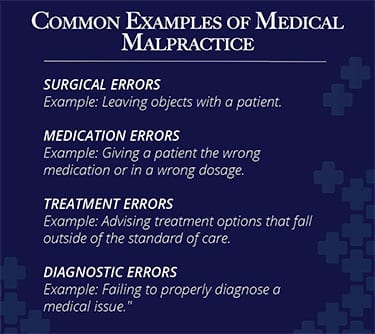If you’ve suffered damages after being treated by a physician in Philadelphia, you may be wondering whether you were a victim of medical malpractice. This guide provides answers to common questions relating to medical malpractice cases in Philadelphia, and will help you determine whether you should consult with an experienced medical malpractice lawyer about your case.
Millions of people visit the doctor’s office or hospital every year, some for routine checkups, some to receive a diagnosis and treatment for a minor illness, and some for more serious complications, amongst other things. While people see their doctors, specialists, or go to the hospital for countless different reasons, everyone who goes to see a medical professional does so because they believe that the medical professional will help them. No one ever visits a medical professional with the assumption that the professional will do them harm.
The fact that people feel this way about the medical care they seek has to do with the standard of care that patients have learned to expect. The standard of care refers to the medical standard that a doctor is held to in diagnosing and treating a patient, and is based on what other medical professionals in the same position would do.
Unfortunately, the expectations of all patients aren’t always met. To be sure, while patients may expect their doctors to treat them with a high level of care and help them to improve their health conditions, all too often, just the opposite is true; patients suffer harm at the hands of medical professionals. When this happens, the patient may have a medical malpractice case.
In this article
This article explores various questions related to medical malpractice in PA, including:
- What is Medical Malpractice Under PA Law?
- What are the Elements of a Successful Medical Malpractice Claim?
- What are the Statue of Limitations for Medical Malpractice in PA?
- What Damages Can Be Claimed in Pennsylvania Malpractice Cases?
- Notable Medical Malpractice Statistics
- Should I Contact a Lawyer About My Case?
What is Medical Malpractice Under Philadelphia Law?
As explained by An Introduction to Medical Malpractice in the United States, medical malpractice is the breach of the standard of care owed to a patient by a trained medical professional.

While the “standard of care” in a typical personal injury case is that which a reasonable person would exercise, as it pertains to medical malpractice, the standard of care is the generally accepted medical practices that are used by a group of medical professionals of similar background and training.
As such, the medical standard of care is different for an obstetrician than it is for an ophthalmologist, a pediatrician for a gynecologist, etc. In other words, a family doctor would not be expected to diagnose or treat cervical cancer, just as a gynecologist wouldn’t be expected to perform an eye exam for a patient.
There are multiple different types of medical malpractice, but anytime that a doctor or other medical professional breaches the duty of care owed to a patient, and the patient is harmed as a result, medical malpractice has occurred. Some of the most common types of medical malpractice include:
- Surgical errors, including leaving objects with a patient, infection, operating on the wrong body part/patient, anesthesia errors, etc.;
- Medication errors, such as giving a patient the wrong medication or in a wrong dosage;
- Treatment errors, ranging from surgical errors, medication errors, failing to start the patient on treatment, or pursuing treatment options that fall outside of the standard of care; and
- Diagnostic errors, including the failure to diagnose.
The list above is not inclusive, but merely provides an idea into the types of medical malpractice that have occurred, and are occurring today.
What are the Elements of a Successful Medical Malpractice Claim?
All medical malpractice claims that are brought forth have four elements:
- The doctor in question owed a professional duty of care to the patient
- This duty of care was breached
- The breach of the duty of care result in harm to a patient
- The injury resulted in damages
The breach of the duty of care is the act of negligence, or malpractice. Examples of this might include failing to refer the patient to a specialist, failing to order tests or blood work, misinterpreting the results of a lab work, failing to ask the patient what medication the patient is using, failing to obtain informed consent, failing to properly sanitize medical equipment pre-surgery, failing to wash hands in between patients, and more.
The damages that a patient may suffer depend greatly on the type of malpractice that the patient is a victim of, the severity of the malpractice, and the patient’s own condition. A patient may require a second surgery, may suffer high medical bills, may undergo pain and suffering, may be unable to return to work, may suffer a disability, and more.
Proving the elements of a successful medical malpractice claim, ranging from breach of duty of care to causation to damages, can be very difficult. This requires investigation and evidence, including the opinions of other medical professionals in the same field.
What is the Statute of Limitation for Medical Malpractice in Philadelphia?
Each state has autonomy is setting its own statutes of limitation, or time limits, regarding how much time a plaintiff has to bring forth a medical malpractice case after harm has occurred. In Pennsylvania, the statute of limitations for medical malpractice cases is two years from the date of malpractice. However, the two-year time period may be extended based on the date of discovery, or the date when the patient discovered (or should have discovered) the act of malpractice.

For example, a patient may not know that they have had a surgical item left within them until months or years after their surgery, when the item causes them complications. As such, the two-year statute of limitations would not begin until the date of discovery.
If a person does not bring forth their medical malpractice claim within the statute of limitations, they forfeit their right to damages entirely. This is why it is very important to begin the claims process as early as possible once you know or think that you may be a victim of malpractice.
Damages in Philadelphia Malpractice Cases
Those who are victims of medical malpractice in Philadelphia have a right to seek damages for all of their losses, including both economic and noneconomic damages.
Economic Damages
Economic damages are those damages which are awarded for actual, economic losses. For example, types of economic damages in a medical malpractice claim might include:
- Medical expenses;
- Future costs of medical expenses, including surgeries and in-home care;
- Lost wages;
- Lost benefits and earning potential; and
- Any other costs associated with the injury, such as household accommodations or medical devices.
Noneconomic Damages
A plaintiff in a medical malpractice claim may also seek noneconomic damages, or damages for things that are intangible and do not have an obvious economic value. Types of noneconomic damages that may be recoverable include damages for:
- Pain;
- Suffering;
- Disability;
- Disfigurement;
- Emotional anguish;
- Loss of quality of life; and
- Distress

There is also a third type of damages available in Philadelphia medical malpractice claims: punitive damages. Punitive damages are not designed to compensate the victim for harm, but are instead intended to punish the defendant for wrongdoing. As such, punitive damages are only available when the act of malpractice was willful or wanton.
Further, punitive damages in Philadelphia are capped at 200 percent of the total amount of compensatory damages. There is no cap on economic or noneconomic damages in the state.
Notable Medical Malpractice Statistics
Medical errors and acts of medical malpractice may be more common than anyone would like to think. To be sure, a study published in BMJ and referenced by Johns Hopkins Medicine lists medical errors in the United States as the third leading cause of death, stating that medical errors kill more people every year than do all other causes of death besides cancer and heart disease.
Consider these other statistics, provided by the 2015 Medscape Malpractice Report:
- Fifty-nine percent of respondents to the Medscape survey have been named in at least one medical malpractice suit;
- According to studies, those doctor types that are most likely to be sued are surgeons and obstetricians/gynecologists;
- The two most common causes of medical malpractice lawsuits are failure to diagnose and the patient suffering abnormal injuries; and
- 41 percent of doctors who responded to the survey said that they felt that, “some doctors are negligent and incompetent,” and therefore suing them is appropriate.
Unfortunately, the data in Pennsylvania may not differ drastically. To be sure, while studies show that the number of medical malpractice lawsuits has steadied in the last 10 years, there were still more than 1,500 medical malpractice lawsuits filed in Pennsylvania’s civil courts in a single year, according to the Insurance Journal.
According to court records for 2015, there were two medical malpractice jury verdicts issued in Pennsylvania for more than $10 million, three for more than $5 million but less than $10 million, and 12 for between $1 million and $5 million. These numbers do not include out of court settlements.
Should I Contact a Lawyer About my Case?
For a patient, being harmed as a result of medical care can be a very scary experience, and a patient may not know what they should do next or how they should proceed. One thing that may be far from their mind is contacting an attorney, and a lawsuit even further.
However, if you believe that medical malpractice has occurred, or if you merely know that you have suffered harm that you think was the fault of your doctor or another medical professional, you should speak with an attorney. An experienced medical malpractice attorney can help you by:
- Evaluating your case;
- Providing you with a free consultation;
- Hiring experts to investigate the malpractice;
- Working with medical professionals who can help to prove both a breach of the standard of care and causation and damages;
- Proving the full extent of damages you have suffered and valuating your claim;
- Making sure that you file your medical malpractice suit within the statute of limitations;
- Negotiating with insurance adjusters; and
- Bringing your case to court.
What You Should Look for in a Medical Malpractice Lawyer in Philadelphia
If you have been seriously injured, you want an attorney who is serious about what they do. This means that you should try to hire an attorney who has experience in medical malpractice law, and preferably the type of medical malpractice that you have suffered (i.e. medical error, delayed diagnosis, surgical error, etc.). You should also work with an attorney who has a history of case success; you do not want to hire an attorney who has lost more cases than they have won.
Working with an attorney that has an established relationship with those in the court system, as well as experts (and the resources to hire experts) is also important. Of course, you also want to work with an attorney who will offer you a free consultation and works on a contingency fee basis.
A contingency fee basis is a system of payment whereby an attorney’s fee is contingent, or dependent, upon your case being settled. This means that if you do not recover a settlement amount, the attorney will not get paid either. If you do recover a settlement, then the attorney’s fee is based on a pre-agreed upon percentage of your winnings.
Why You Should Contact the Philadelphia Medical Malpractice Attorneys at Lowenthal & Abrams, PC
At the law offices of Lowenthal & Abrams our attorneys have been recognized by Newsweek as the top attorneys in the country, and we have won multiple awards and recognitions. Our office was founded 40 years ago, and since that time, we have recovered more than $100 million in settlements and verdicts for our clients.
Not only are we skilled negotiators who are confident in our ability to fight for you outside of the courtroom, but we also have trial experience, and have been in a courtroom numerous times throughout our years in business, too. We have 15 lawyers on our team, including one lawyer who is both lawyer and doctor, and one who is both lawyer and nurse. This gives us an edge in litigating medical malpractice cases.
If you need an experienced Philadelphia medical malpractice attorney on your side whom you can trust, contact us today. Remember, time is ticking – it is important that you take action now. You can contact our lawyers by calling us directly, or write us a message using the form on our website. We promise to work hard for you!
 Free Consultation
Free Consultation











